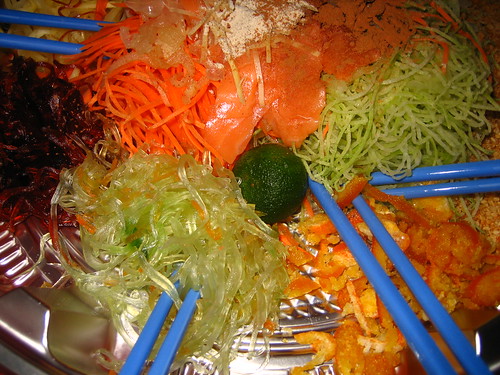 |
| Scroll saying 生意興隆/生意兴隆 (sheng yi xing long), or 'may the business thrive greatly' |
The most common greetings you'll hear are 新年快乐 (xin nian kuai le), 'happy new year' and 恭喜发财 (gong xi fa cai), 'congratulations on receiving riches and prosperity'.
Riches are a recurrent theme in Chinese culture, especially around Chinese new year. Fortune-related greetings for businesses include 财源广进 (cai yuan guang jin), or 'may riches enter in huge volumes', and 生意興隆/生意兴隆 (sheng yi xing long), or 'may the business thrive greatly'. 年年有餘/年年有馀 (nian nian you yu), 'surpluses every year', 大吉大利 (da ji da li), 'lots of fortune and profits' as well as 马到成功 (ma dao cheng gong), 'instant success', are spot on both for businesses and individuals.
马 到成功 is especially apt in the year of the horse (most recently, 2014), as the character for horse, 马, begins the greeting, but it can be used at any other time as well. There are lunar new year greetings which mention the specific year, such as x年大吉 (x nian da ji), 'great fortune in the year of the x', and x年行大運/x年行大运, 'great luck in the year of the x'. Just substitute the underlined character with the appropriate animal. 2016 is the year of the monkey, for instance, and 2017 will be the year of the rooster.
Beyond these traditional greetings are some which are more relevant to those working. 新年进步 (xin nian jin bu), which means 'making progress in the new year', 心想事成 (xin xiang shi cheng), 'may your wishes come true', and the simple 工作顺利 (gong zuo shun li), 'may your work go smoothly', will all be well received. 事业有成 (shi ye you cheng) 'success in what you're working on' and 平步青云 (ping bu qing yun), 'an easy path to a meteoric rise' are equally auspicious. Another greeting revolving around 步 (steps) is 步步高升 (bu bu gao sheng), or 'rising higher with each step taken'.
 |
| Before the lohei starts. |
These greetings are also said at traditional Chinese new year banquets in Malaysia and Singapore, during the lohei (撈起) part which precedes the meal proper. During the lohei, yusheng (鱼生), a raw fish* salad, is prepared. The tradition is to add ingredients for the salad individually, accompanied by auspicious sayings, after which diners mix (lo) the salad with chopsticks while calling out the same greetings as wishes for the coming year. The higher the salad is raised (hei), the better the luck for the coming year.
If you can't remember too many greetings, don't worry - a simple 'x nian kuai le' or 'happy new year in the year of x' is quite appropriate. The whole idea is to start off the year right, and it's traditional to hope for fortune, prosperity and success. 万事如意 (wan shi ru yi), 'may all things be as you wish'!
A version of this post first appeared in a sister blog, WorkSmartSG, which is no longer updated.
*Raw freshwater fish is no longer served in Singapore yushengs as of 2016 because of the danger of group B streptococcus infections. The protein is replaced with raw salmon, abalone or top shell.